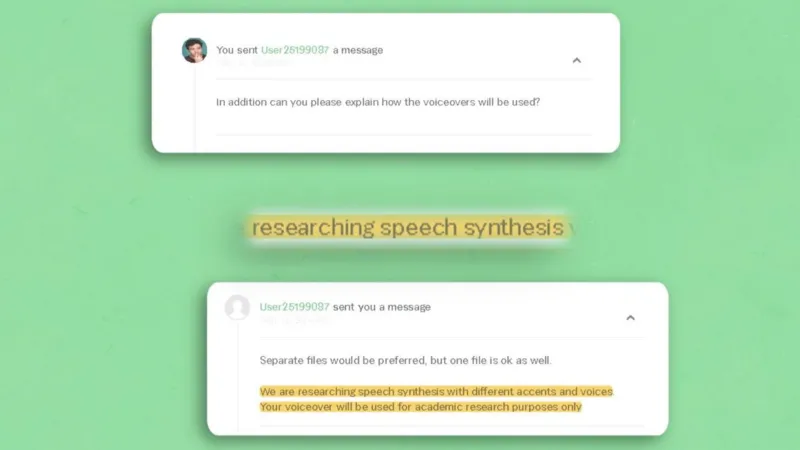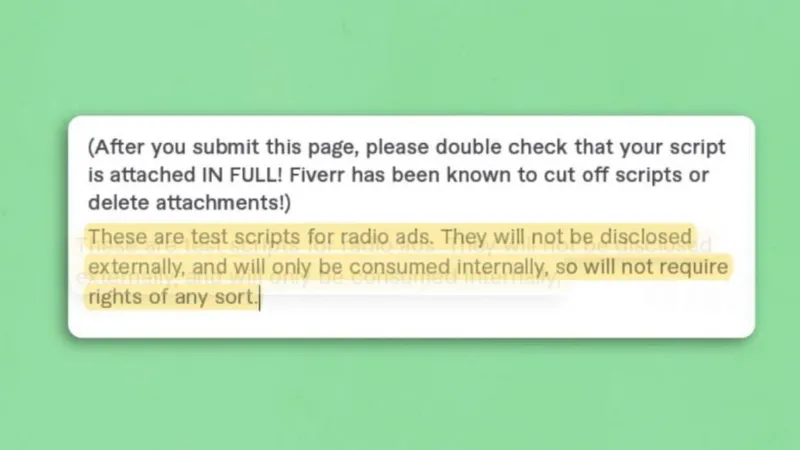A Tech Company Stole and Sold our Voices 1.
The idea that artificial intelligence might eventually take over human jobs has been a prevalent topic in recent years. For Paul Skye Lehrman and his partner Linnea Sage, this warning became deeply personal when they unexpectedly heard their own voices discussing the issue. In June 2023, while driving near their home in New York City, they tuned into a podcast focused on the effects of AI on the entertainment industry, particularly in light of ongoing strikes in Hollywood.
As voice-over performers, both Paul and Linnea have been concerned about the rise of human-like voice generators potentially replacing their work. The podcast episode featured an intriguing segment where an AI-powered chatbot, equipped with advanced text-to-speech technology, was interviewed about the implications of AI in Hollywood. To their astonishment, when the chatbot spoke, it sounded just like Mr. Lehrman.
The shocking realization prompted them to pull over the car. “The irony that AI is coming for the entertainment industry, and here is my voice talking about the potential destruction of the industry, was really quite shocking,” Paul reflected. That evening, they spent hours online searching for information, ultimately discovering the text-to-speech platform Lovo, where they found that Ms. Sage’s voice had also been replicated.
Feeling stunned and violated, Linnea expressed disbelief at the situation. “A tech company stole our voices, made AI clones of them, and sold them possibly hundreds of thousands of times,” she stated. In response to this unsettling revelation, the couple has filed a lawsuit against Lovo, which has yet to respond to their claims or to inquiries from Dandali.
Clone wars
The couple has raised concerns about how Lovo managed to replicate their voices, alleging that this was done deceitfully. They claim that the company’s practices were misleading and not transparent.
Tom Lee, a co-founder of Lovo, previously explained that their voice-cloning technology requires users to read approximately 50 sentences to generate an accurate voice clone. He stated, “We can capture the tone, character, style, phonemes, and even accents.”
In their legal complaint, the couple detailed how Lovo allegedly acquired a recording from them. They assert that unidentified Lovo employees reached out through Fiverr, a well-known freelance platform, where they were offering audio services for various media.
In 2019, Ms. Sage reported that a user contacted her with a request to record several generic radio scripts for testing purposes. Such test recordings are typically utilized in film and television for focus groups, internal evaluations, or as placeholders during production, leading to lower costs compared to broadcast audio.

Ms. Sage completed the task, submitted the audio files, and received $400 (£303) for her work. Approximately six months later, Mr. Lehrman received a similar request to record a series of generic radio advertisements.
The couple shared messages with Dandali in which the anonymous Fiverr user indicated that the audio would be used for research on “speech synthesis.” Mr. Lehrman sought assurance that the scripts would not be used beyond the stated research project.
When he inquired about the project’s objective, the user replied, “The scripts will not be used for anything else,” but added that they could not disclose the goal due to confidentiality.
Mr. Lehrman also asked if the final recordings would be repurposed or used in a different sequence, to which the user assured him that the files were strictly for research purposes. After completing the recordings, Mr. Lehrman was compensated $1,200.
The couple’s concerns center around the lack of transparency from the anonymous user, as they believed their recordings were intended solely for research, not for creating a voice clone.
Ultimately, they feel misled by Lovo’s practices, raising questions about the ethical implications of using such technology without clear consent.

What does the law say?
The couple has initiated a lawsuit, claiming that Lovo utilized recordings of their voices to produce unauthorized copies that compete with their authentic voices. They assert that this was done without their consent or fair compensation. As a class action lawsuit, they hope to attract other claimants to join their cause, although none have come forward at this point.
Legal experts believe the case will likely revolve around the concept of rights of publicity, also known as personality rights. Violations in this area typically arise from the misuse or misrepresentation of an individual’s image or voice. Additionally, there may be issues related to breach of contract concerning the licenses that Ms. Sage and Mr. Lehrman provided to the individual who commissioned the recordings.
Professor Kristelia Garcia, an intellectual property law expert at Georgetown University, highlighted the specificity of licenses. She explained that licenses are granted for particular and limited uses. For example, if someone were to receive permission to use a swimming pool for one afternoon, that does not imply they can use it freely or host a party at any time.
The outcome of this case could have significant implications, as it adds to the growing list of lawsuits initiated by artists, authors, illustrators, and musicians who are determined to protect their creative work and livelihoods. This trend reflects broader concerns about the impact of technology on creative industries.
As the legal landscape evolves, many experts predict that the challenges posed by artificial intelligence will only intensify. Recently, the financial firm Klarna announced plans to reduce its workforce by half through AI implementation, underscoring the potential for widespread job disruption.
For Mr. Lehrman and Ms. Sage, the anxieties surrounding AI are not just theoretical; they are experiencing the effects firsthand. Their situation highlights the urgent need for clarity and protection in the realm of creative rights as technology advances.
“This whole experience has felt so surreal,” Ms. Sage remarked, expressing her disbelief at how AI is encroaching on human creativity. “When we thought about artificial intelligence, we envisioned it doing mundane tasks like folding laundry and cooking, not infringing on our artistic endeavors.”





